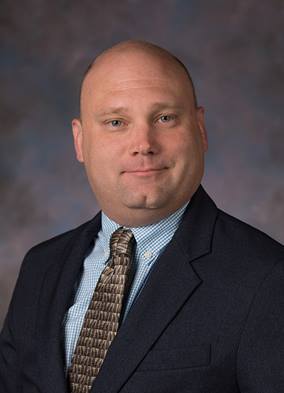Featured Researcher — Jonathan Slaughter, MD, MPH
Featured Researcher — Jonathan Slaughter, MD, MPH https://pediatricsnationwide.org/wp-content/themes/corpus/images/empty/thumbnail.jpg 150 150 Katie Brind'Amour, PhD, MS, CHES Katie Brind'Amour, PhD, MS, CHES https://pediatricsnationwide.org/wp-content/uploads/2021/03/Katie-B-portrait.gif- January 11, 2023
- Katie Brind'Amour, PhD, MS, CHES
Jonathan Slaughter, MD, MPH, neonatologist and principal investigator in the Center for Perinatal Research at Nationwide Children’s Hospital, works to identify best practices and reduce treatment variation to improve neonatal clinical care and outcomes.
His career took off when, after casually observing practice variation across the institutions where he received training, he noticed that preterm infants often received different treatments at different institutions, usually owing to lack of solid evidence for those therapies.
Case in point: infants with an unclosed patent ductus arteriosus (PDA) are managed with everything from a wait-and-see approach to non-steroidal anti-inflammatory drugs (NSAIDs) to percutaneous or even surgical interventions.

As it turned out, some approaches weren’t always beneficial.
Fast-forward more than a decade, and Dr. Slaughter, in collaboration with other investigators in the Center for Perinatal Research, has multiple grants to study PDA closure practices and outcomes to determine how to offer the most appropriate treatments to all neonates.
In addition to growing these PDA efforts to lead a randomized, 22-site investigation, Dr. Slaughter serves as Nationwide Children’s alternate principal investigator for the National Institute of Child Health and Human Development’s 15-site Neonatal Research Network. He stays busy with a wealth of other collaborations and grants as well, studying everything from hyperbilirubinemia management to the impact of kidney and urinary tract anomalies on neonatal outcomes.
Read on to learn more about Dr. Slaughter and his work.
Why did you decide to pursue a career as a neonatologist and researcher?
I was drawn to pediatrics in medical school when I realized I liked working with children more than adults. I fell in love with the neonatal intensive care unit (NICU) during a NICU rotation that was prompted by my obstetrics rotation, when I really enjoyed checking up on the babies each morning before rounds.
I realized that many commonly used NICU treatments were never studied well in babies, but instead only in older children and adults. I decided to research them to figure out which are helpful and which are not.
How did you get from there to your current role?
I attended medical school, pediatric residency and my neonatal fellowship at different institutions before joining Nationwide Children’s as a faculty member. I realized that some treatment decisions differed in the NICUs across these four institutions. I began to focus on drug utilization research to document these variations, and I found they existed throughout U.S. children’s hospitals. Treatments had little evidence behind them. By publishing, I was able to convince others that these deficits in our knowledge needed to be addressed.
I obtained funding through an NIH K08 career development award to study the use of NSAIDs to close the PDA in preterm infants. This open blood vessel serves to bypass the lung circulation prior to birth but should close within several days after the infants are born if they are not born prematurely. In preterm infants, the PDA often stays open, and those babies are at higher risk for worse outcomes.
In the 1970s, physicians found that NSAIDs help some PDAs close earlier and that PDA can be surgically closed. So for 30 years, clinicians assumed that persistent PDAs should be closed, and the U.S. Food and Drug Administration approved two NSAIDs (indomethacin and ibuprofen) to close PDA, even though none of the research trials showed an improvement in outcomes following treatment.
Alongside my mentors, I surveyed over 40 NICUs about their practices for evaluating and treating PDA. We found that preterm babies treated with NSAIDS did not have reduced odds of dying or developing chronic lung disease of prematurity compared to untreated infants. Knowing that NSAIDs can be harmful in some patients, we don’t want to use them unless we discover in the future that these drugs offer benefit to certain groups of preterm infants based on their specific PDA risk factors.
Now, I collaborate with other researchers at Nationwide Children’s and across the country to do further research in PDA treatment and outcomes. I also study many other neonatal therapies and NICU practices across institutions.
Why did you decide to pursue your work here at Nationwide Children’s?
We have a large and unique Center for Perinatal Research, the support of Clinical Research Services, and one of the largest neonatology programs in the country.
Fun Facts About Dr. Slaughter
What do you usually eat for breakfast?
A granola bar and, sadly, often Diet Coke. I like dinner for breakfast, too — cold pizza, if there is any!
What would be your dream job besides working in research?
I always thought if I hadn’t gone to medical school, I would be an American history professor. Otherwise, I’d do something outdoors, like be a park ranger, gardener or farmer.
What’s your favorite food?
Mexican street tacos.
Favorite band/genre/artist?
I like alternative rock, but more recently I’ve gravitated toward acoustic folk music. I really like the sound of an old-time fiddle. Over the past decade, I’ve been slowly learning how to play the mandolin and fiddle, and I like to play old-time Appalachian music, Celtic music and bluegrass.
Favorite way to relax?
Reading, gardening, traveling and doing stuff outside. TV works, too!
Favorite thing you’ve bought this year?
We took a big family trip to see a lot of the national parks out west, from close to Mexico to close to Canada — Zion, the Grand Canyon, the Grand Tetons and Yellowstone and Glacier. It was amazing.
We have grown our clinical research in neonatology significantly over the 12 years I have been here, and we have the support to grow our epidemiological expertise in our center to answer more and more questions about practice variation and quality improvement opportunities in neonatology.
At Nationwide Children’s, we also have access to amazing cross-disciplinary collaborations with neonatal experts in cardiology, gastroenterology, maternal health, and most other fields we might want, which offers complementary strengths for this type of research. We have been learning a lot about growing our infrastructure for leading multi-institutional research projects, and we have the support of Nationwide Children’s to make it all happen.
What’s next?
I plan to continue researching and collaborating with others around the world to improve neonatal care by determining which frequently used but understudied treatments are indeed beneficial for neonates.
I have also been closely collaborating with Carl Backes, Jr., MD, another principal investigator in my center who is a practicing neonatologist at Nationwide Children’s, on our 22-site randomized trial, named PIVOTAL, to determine if minimally invasive catheter-based closure of PDA during the first postnatal month in mechanically ventilated infants with persistent, hemodynamically and clinically symptomatic PDA improves respiratory and neurodevelopmental outcomes. We anticipate enrolling the first patient by February 2023 and completing the trial in 2027.
In addition, the first results of our prospective cohort investigation, the PDA Prediction Cohort, should be analyzed in early 2023. That study follows infants with PDA to help us ultimately predict whether and when an infant’s PDA might close without treatment. It will also help identify clinical risk factors and PDA-specific echocardiogram measurements and biomarkers that are present in the first postnatal month and associated with poorer longer-term outcomes in these infants. Ultimately, we anticipate these findings will improve PDA management by reducing unnecessary and harmful overtreatment of infants who have a high probability of early, spontaneous PDA closure. The results should permit us to develop randomized trials to examine the effectiveness of PDA closure in those “high-risk” infants most likely to receive benefit.
Additionally, I will keep collaborating with investigators around the country and the world to complete cohort studies and randomized trials that lead to improved neonatal outcomes. I currently have several grant applications in the works, as well.
About the author
Katherine (Katie) Brind’Amour is a freelance medical and health science writer based in Pennsylvania. She has written about nearly every therapeutic area for patients, doctors and the general public. Dr. Brind’Amour specializes in health literacy and patient education. She completed her BS and MS degrees in Biology at Arizona State University and her PhD in Health Services Management and Policy at The Ohio State University. She is a Certified Health Education Specialist and is interested in health promotion via health programs and the communication of medical information.
-
Katie Brind'Amour, PhD, MS, CHEShttps://pediatricsnationwide.org/author/katie-brindamour-phd-ms-ches/April 27, 2014
-
Katie Brind'Amour, PhD, MS, CHEShttps://pediatricsnationwide.org/author/katie-brindamour-phd-ms-ches/April 27, 2014
-
Katie Brind'Amour, PhD, MS, CHEShttps://pediatricsnationwide.org/author/katie-brindamour-phd-ms-ches/April 27, 2014
-
Katie Brind'Amour, PhD, MS, CHEShttps://pediatricsnationwide.org/author/katie-brindamour-phd-ms-ches/April 28, 2014
- Posted In:
- Clinical Updates
- Featured Researchers
- Research







